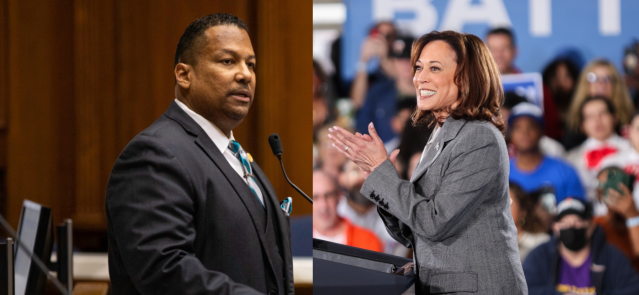Stay ahead of the curve as a political insider with deep policy analysis, daily briefings and policy-shaping tools.
Request a Demo
Candidates John Rust, left; Nikki Haley, center; and Sid Mahant. (Credit: State Affairs, Haley and Mahant campaigns)
At least 10 candidates for Congress or the Legislature face being taken off Indiana’s May primary ballot in the wake of a state Supreme Court order allowing enforcement of the state’s two-primary voting standard for Republican or Democratic candidates.
The most prominent of those at risk is John Rust, the Republican U.S. Senate candidate who challenged the constitutionality of the law.
Rust is the subject of several challenges filed with state election officials by Friday’s deadline. Also facing likely removal when the state Election Commission meets next week is a Democratic candidate for governor.
Republican presidential candidate Nikki Haley will be listed on the Indiana ballot as no challenges were filed against her despite recent taunting from Donald Trump’s campaign that she wouldn’t gather the required petition signatures to qualify.
Rust vows to fight on despite ruling
Several near-identical challenges were submitted against Rust, the former board chairman of the Seymour-based egg producer Rose Acre Farms who has sought to run against U.S. Rep. Jim Banks for the Republican Senate nomination.
Rust likely will be taken off the primary ballot as a Supreme Court order issued Thursday supported a state law adopted in 2021 requiring candidates appearing on Republican or Democratic primary ballots to have chosen that party’s ballot in the two most recent primaries in which they voted. Or candidates can provide certification of party affiliation from their county party chair.
Rust acknowledged he voted in Democratic primaries in 2010 and 2012 before voting in the 2016 Republican primary. The Jackson County Republican chair has said she would not certify Rust as a Republican, citing his previous Democratic primary votes.
Rust’s lawsuit argued that the two-primary requirement violated constitutional rights of free speech, association and equal protection. He plans taking his legal fight to the U.S. Supreme Court, contending the law leaves more than 80% of Indiana voters ineligible for party primaries and that running as an independent or write-in candidate is not a viable option.
“It is absolutely wrong that 81% of Hoosiers are banned from running for political office,” Rust told State Affairs. “It is just wrong, and I am confident the United States Supreme Court will halt that.”
Other candidates caught up by Supreme Court’s order
A majority vote of the Election Commission, which is made up of two Republicans and two Democrats, is needed to remove any candidates from the primary ballot. The commission is scheduled to meet on Feb. 27.
The commission voted in 2022 to remove candidates who didn’t meet the two-primary rule and those running for statewide offices who did not submit the required 500 petition signatures of registered voters from all nine congressional districts.
Several of those candidates argued that the laws were unfair, but the commission members said they had no choice but to enforce the laws.
Five congressional candidates face challenges on the grounds of not meeting the two-primary voting rule, including Sid Mahant, a trucking company owner who has loaned $2 million to his campaign against several others for the Republican nomination for the 6th Congressional District seat being given up by Rep. Greg Pence.
Other congressional candidates facing similar challenges are Republicans Jonathan Brown and Scott King and Democrat Ryan Pfenninger in the 5th Congressional District now held by Republican Rep. Victoria Spartz, and Republican Trent Lester who filed against Rep. Jim Baird in the 4th Congressional District.
Challenges to Trump, Biden but not Haley
The primary ballot spot for Haley, the former South Carolina governor and U.N. ambassador, wasn’t challenged even after Trump’s campaign taunted her on social media in recent weeks about her having a precarious petition signature situation.
Unofficial tallies submitted by county offices to the state Election Division showed Haley’s campaign just clearing the minimum with 509 signatures in the 7th Congressional District, which is completely within Marion County.
Carlin Yoder, a former state senator who is the Trump campaign’s state director, said Haley’s signatures were questionable but there was no point in challenging her ballot position.
“We’ve got bigger things to go after than worrying about her being on the ballot at this point when she really should be dropping out already,” Yoder told State Affairs. “She’s almost irrelevant at this point.”
Challenge petitions were filed by a voter against Trump’s ballot eligibility on the 14th Amendment’s ban on officeholders who “engaged in insurrection” from holding office again and against President Joe Biden claiming, without submitting any evidence, his campaign submitted fraudulent petition signatures.
The U.S. Supreme Court could rule soon on such constitutional challenge arguments made in other states but Yoder called the Indiana challenge a “joke” from liberals worried about Trump beating Biden.
“It won’t work,” Yoder said. “I’m not worried about that.”
Yoder said the Trump campaign had no role with the challenge against Biden, filed by a frequent Republican office candidate.
Democratic candidate filed on principle
Tamie Dixon Tatum of Anderson filed her candidacy for Democratic nomination for governor even though she knew she didn’t meet the signature requirement.
A challenge petition against Tatum claims she only submitted 1,896 total signatures and met the 500-signature minimum in only one congressional district. The challenge was filed by a top staffer to Jennifer McCormick when she was state schools superintendent — and Tatum’s removal would leave McCormick as the sole Democratic candidate.
Tatum submitted a challenge against McCormick on the grounds that the state Democratic Party unfairly favored her for the nomination.
Tatum, who was the unsuccessful Democratic candidate for a state Senate seat in 2022, told State Affairs she believed voters deserved to have choices on the ballot.
“I think the signature requirement is designed to be nearly impossible,” Tatum said. “I believe that it squeezes out the common person. You know, I’m not a millionaire and I shouldn’t have to be one to run.”
Tom Davies is a Statehouse reporter for State Affairs Pro Indiana. Reach him at [email protected] or on X at @TomDaviesIND.
X @StateAffairsIN
Facebook @stateaffairsin
Instagram @stateaffairsin
LinkedIn @stateaffairspro
4 things to know about Braun’s property tax proposal
Sen. Mike Braun, the Republican candidate for Indiana’s governor, released a plan for overhauling property taxes Friday morning that would impact millions of Hoosiers, Indiana schools and local governments. “Nothing is more important than ensuring Hoosiers can afford to live in their homes without being overburdened by rising property taxes driven by rapid inflation in …
Bureau of Motor Vehicles looks to add new rules to Indiana’s driving test
The Bureau of Motor Vehicles wants to amend Indiana’s driving skills test, putting “existing practice” into administrative rule. Indiana already fails drivers who speed, disobey traffic signals and don’t wear a seatbelt, among other violations. Yet the BMV is looking to make the state’s driving skills test more stringent. A proposed rule amendment looks to …
In Indianapolis, Harris says she’s fighting for America’s future
Vice President Kamala Harris, the presumptive Democratic presidential nominee, told a gathering of women of color in Indianapolis on Wednesday that she is fighting for America’s future. She contrasted her vision with another — one she said is “focused on the past.” “Across our nation, we are witnessing a full-on assault on hard-fought, hard-won freedoms …
Indiana Black Legislative Caucus endorses Harris, pledges future support
The Indiana Black Legislative Caucus unanimously voted Wednesday to endorse Vice President Kamala Harris’ presidential run and will look at ways to assist her candidacy, the caucus chair, state Rep. Earl Harris Jr., D-East Chicago, told State Affairs. The caucus is made up of 14 members of the Indiana General Assembly, all of whom are …




